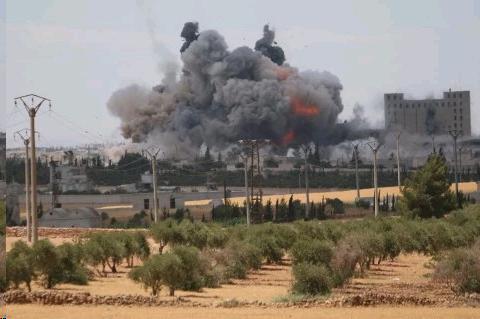
Dozens of State Department employees signed and submitted a memo early this week urging the Obama administration to adopt a more aggressive stance against the Syrian government of President Bashar al-Assad, including the use of military force.
The 51 signatories to the document, which was sent through the department’s internal “dissent channel,” were largely mid-level diplomats based in Washington and overseas, including a Syria desk officer and the consul general in Istanbul, and some described by one official as having “only peripheral involvement” with Syria policy.
The memo calls on the administration to respond to the worsening humanitarian situation in Syria — where at least a quarter of a million people have been killed in five years of civil war and nearly half the population has been internally displaced or has fled the country --with air attacks and other “stand-off” weapons, fired from a distance without troops on the ground, to force Assad into U.S.-led negotiations to end the conflict.
Much of the thrust of the document has been advocated inside the administration by Secretary of State John F. Kerry for much of his time in office. President Obama has consistently resisted direct U.S. military involvement in the war, saying that it would simply add to the bloodshed and not improve the situation in Syria.
Kerry, who is not due to return from an overseas trip until late Friday, has been told about the memo, which was delivered Tuesday to the State Department’s Office of Policy Planning. The White House was informed Thursday, after it became apparent the document had been leaked to the media. It first appeared in the New York Times online several hours later.
But several senior officials, who spoke on the condition of anonymity because they were not authorized to comment publicly on the subject, expressed frustration that the memo had been made public and concern that it could undercut the secretary’s own arguments. Others said the authors may not have known of Kerry’s position in internal administration debates, or hoped to buttress it.
The “judicious” use of the attacks it described “would undergird and drive a more focused and hard-nosed U.S.-led diplomatic process,” the memo said.
Even as it launched an aggressive bombing campaign against the Islamic State in Syria and Iraq, the White House has gingerly approached the separate Syrian conflict. Over the past several years, it has expressed dismay at the lack of political and military organization of moderate opposition forces, and expressed continued concern that any weapons it gives to opposition fighters can end up in the hands of the Islamic State or Jabhat al-Nusra, al-Qaeda’s affiliate in Syria.
Former secretary of state Hillary Clinton, who left the administration at the end of Obama’s first term, has said that she had argued for a more robust U.S. posture while in office, including the establishment of U.S.-protected safe zones for civilians and opposition fighters. She has repeated that call during her campaign for the presidency.
Numerous Republican lawmakers have urged U.S. airstrikes against Assad the use of U.S. military force against Assad, and some have called for American troops on the ground. Donald Trump, the presumptive GOP presidential nominee, has said he would concentrate on the Islamic State and would leave Assad alone.
Early this year, as the humanitarian situation worsened, with at least 19 communities besieged by Syrian government forces, aided by Russian air attacks, Kerry negotiated an international agreement with Russia and others for a cease-fire and food and medical deliveries to communities that in some cases have been cut off from aid for years.
While the ceasefire sporadically continues in some places — the United States and Russia said this week that a new 48-hour truce was being implemented in the city of Aleppo — it has largely collapsed in key parts of the country. Russia, which said when the ceasefire began that it would suspend its own bombing on Assad’s behalf, cut back but never fully stopped, according to U.S. officials who have repeatedly charged the bombs are largely directed at the U.S.-backed moderate opposition.
Although the situation has reportedly improved somewhat this week, the United Nations, has charged the Assad government with continuing to block aid delivery in some places.
The persistent bombing and humanitarian disaster led refugees who have flooded Turkey and other neighboring countries over the years to seek further refuge in Europe, causing political crisis there.
Meanwhile, the bombing and the ongoing humanitarian disaster led the opposition to suspend U.N.-sponsored negotiations over a political solution to the conflict.
The dissent memo said the signers were not “advocating for a slippery slope that ends in a military confrontation with Russia,” although it was not clear how such a clash could be avoided, given the already-crowded skies over Syria and Russia’s support for Assad.
The State Department’s dissent channel was established during the Vietnam War. According to the official Foreign Affairs Manual, it is department policy that “all U.S. citizen employees, foreign and domestic, be able to express dissenting or alternative views on substantive issues of policy, in a manner which ensures serious, high-level review and response.”
It was created, the manual says, for use “when such views cannot be communicated in a full and timely manner through regular operating channels or procedures, to the attention of the Secretary of State and other senior State Department officials in a manner which protects the author from any penalty, reprisal or recrimination.”
- Publish my comments...
- 0 Comments
